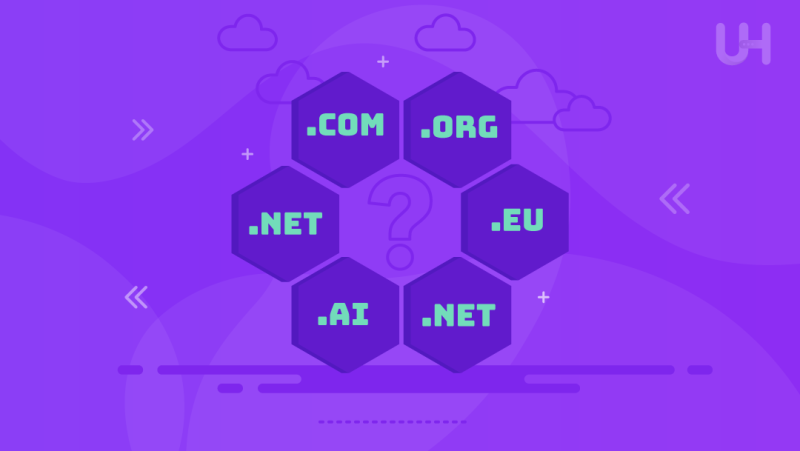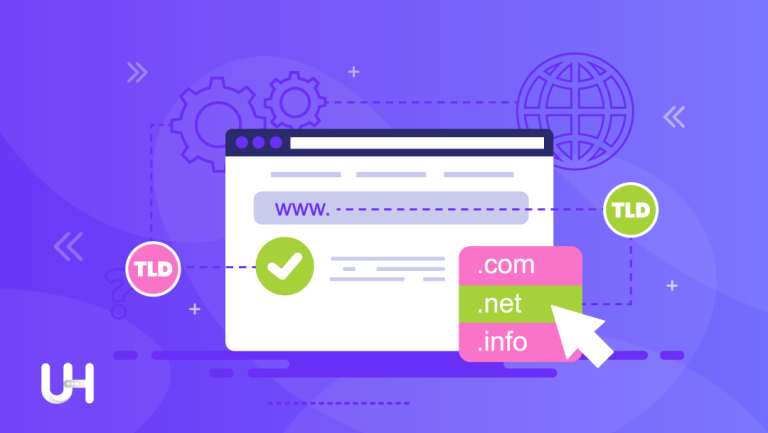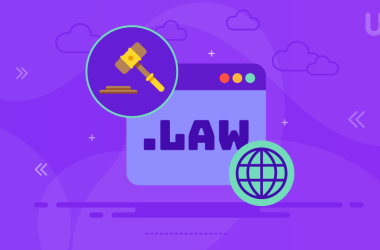Domain extensions, also called top-level domains (TLDs), are like tags added to the end of website addresses. They tell you about what the website is for. For instance, .com is often used for businesses, .org for organizations, and .edu for educational institutions. These tags are more than just letters – they help people understand and trust websites.
Knowing about domain extensions is really important for anyone putting a website online. By picking the right extension, like .com or .org, you can make your website easier to find and show people what it’s all about. Whether you’re starting a blog, selling stuff online, or promoting your company, choosing the right domain name extension is a big deal. It’s like picking the perfect name for your online home.
History of Domain Extensions
In the early days of the internet, back in the 1980s and early 1990s, the digital landscape was vastly different from what we see today. The concept of the World Wide Web was still new, and there were only a handful of domain extensions available. These extensions were primarily aimed at categorizing websites into broad groups based on their intended use. For instance, .com was reserved for commercial ventures, .org for non-profit organizations, .net for network infrastructure, and .edu for educational institutions. This limited selection meant that website owners had to get creative with their domain names, often resorting to lengthy and convoluted addresses to distinguish their online presence.
Introduction of Generic Top-Level Domains (gTLDs)
As the internet gained popularity and the number of websites exploded, there was a pressing need for more domain extension options to accommodate the growing diversity of online activities. In response to this demand, the concept of generic top-level domains (gTLDs) was introduced. The introduction of gTLDs marked a significant milestone in internet history, as it vastly expanded the pool of available domain extensions beyond the original handful. With the introduction of extensions like .biz, .info domain, and .mobi, website owners gained greater flexibility in choosing domain names that accurately reflected their business or interests. This expansion not only provided more options for website naming but also helped users navigate the internet more efficiently by providing clearer signals about the nature of websites.
Expansion of Domain Extension Options Over Time
The evolution of domain extensions has been characterized by a continuous expansion and diversification of the domain namespace to meet the evolving needs of internet users. One of the most notable developments in recent years has been the introduction of the New gTLD Program by ICANN. This program aimed to introduce hundreds of new gTLDs, covering a wide range of categories and industries. These new extensions, such as .tech domain, .finance domain, and .blog domain, offered website owners even more opportunities to create unique and memorable domain names that resonated with their target audience.
Additionally, the addition of country code top-level domains (ccTLDs) has further enriched the domain landscape, allowing businesses and individuals to establish a localized online presence. With extensions like .CN domain, .UK domain, and .IN domain, website owners can target specific geographic markets and build trust among local audiences. Overall, the expansion of domain extension options reflects the dynamic nature of the internet and its continued growth and evolution as a global communication and commerce platform.
Types of Domain Extensions
Generic Top-Level Domains (gTLDs)
Generic top-level domains, or gTLDs, are among the most common and recognizable domain extensions. They are versatile and applicable across various industries and purposes. A gTLD is typically comprised of three or more characters and can represent a wide range of websites, from commercial ventures to informational resources. Some examples of gTLDs include:
- .com: Originally intended for commercial entities, .com has become the most widely used and recognized domain extension globally.
- .org: Short for “organization,” .org domain is commonly associated with non-profit organizations, community groups, and advocacy causes.
- .net: Originally designated for network infrastructure purposes, .net domain is often used by internet service providers, networking organizations, and technology companies.
Country Code Top-Level Domains (ccTLDs)
Country code top-level domains, or ccTLDs, are domain extensions specific to particular countries or territories. They are two-letter codes corresponding to the ISO 3166-1 alpha-2 standard, representing the geographic origin or affiliation of a website. Some examples of ccTLDs include:
- .UK: Representing the United Kingdom, .uk is commonly used by businesses, organizations, and individuals based in the UK.
- .DE: Signifying Germany, .de domain is widely utilized by German businesses, government agencies, and personal websites.
- .CA: Denoting Canada, .ca is the preferred choice for Canadian businesses, educational institutions, and government entities.
New Generic Top-Level Domains (ngTLDs)
New generic top-level domains, or ngTLDs, are a recent addition to the domain extension landscape, introduced through initiatives such as the New gTLD Program. These extensions offer a broader array of options beyond traditional gTLDs, catering to specific industries, interests, and communities. Some examples of ngTLDs include:
- .tech: Catering to the technology sector, .tech is popular among tech startups, software developers, and IT professionals.
- .blog: Designed for bloggers and content creators, .blog provides a dedicated space for sharing thoughts, ideas, and creative endeavors.
- .store: Tailored for e-commerce businesses, .store domain offers a memorable and relevant domain extension for online retailers and storefronts.
Sponsored Top-Level Domains (sTLDs)
Sponsored top-level domains, or sTLDs, are specialized domain extensions that serve specific communities, industries, or interest groups. These extensions are typically managed by organizations for promoting and governing the associated domain namespace. Some examples of sTLDs include:
- .edu: Restricted to accredited post-secondary educational institutions, .edu signifies websites affiliated with universities, colleges, and academic institutions.
- .gov: Reserved for government agencies and entities, .gov is used exclusively by federal, state, and local government websites within the United States.
- .museum: Intended for museums and cultural institutions, .museum provides a dedicated online space for showcasing art, history, and cultural heritage.
These various types of domain extensions offer website owners and businesses a wide range of options to choose from, allowing them to select a domain extension that aligns with their branding, audience, and objectives. Whether aiming for global reach with a .com or targeting a specific geographic market with a ccTLD, understanding the nuances of each domain extension type is essential for making informed decisions when registering a domain name.
Explore Your Domain Extension Options Today!
Ready to choose the perfect domain extension for your website? Visit Ultahost to browse a wide range of domain extensions and find the one that suits your needs.
How Domain Extensions Affect Websites
SEO Implications
Domain extensions play a crucial role in search engine optimization (SEO), impacting a website’s visibility and ranking on search engine results pages (SERPs). While content quality and relevance remain paramount in search algorithms, domain extensions can subtly influence user perception and click-through rates.
For instance, research suggests that websites with a .com extension tend to receive higher click-through rates compared to other extensions, as .com is widely recognized and trusted by internet users. Moreover, domain extensions can indirectly affect SEO metrics such as domain authority and backlink acquisition. A well-chosen domain extension that resonates with user expectations and industry standards can enhance a website’s credibility and authority, thereby contributing to improved search rankings and organic traffic.
Branding Considerations
Domain extensions are integral to a website’s branding strategy, serving as a digital representation of the brand’s identity and values. The choice of extension can convey subtle yet powerful messages about the nature and purpose of the website. For instance, a .com extension is often associated with commercial ventures and can project a professional and business-oriented image.
Conversely, a .org extension may evoke a sense of community and social responsibility, appealing to organizations with a mission-driven focus. By selecting a domain extension that aligns with their brand identity and target audience expectations, businesses can enhance brand recognition and establish a strong online presence that resonates with their customers.
Geographic Targeting
For businesses operating in specific regions, domain extensions play a pivotal role in geographic targeting and localization strategies. Country code top-level domains (ccTLDs) provide a clear indication of a website’s geographic relevance. Also, helps businesses establish trust and credibility with local consumers. For example, a business targeting customers in Australia may opt for a .AU domain extension to signal its affiliation with the Canadian market.
Similarly, businesses operating internationally may utilize multiple ccTLDs to tailor their online content and offerings to specific geographic audiences. By selecting domain extensions that align with their target regions or countries, businesses can enhance their visibility. It will increase relevance and engagement with local consumers ultimately driving conversions and business growth.
In short, domain extensions wield significant influence over a website’s SEO performance, branding effectiveness, and geographic targeting strategies. By carefully considering these factors and selecting a domain extension that aligns with their goals and audience preferences, website owners can optimize their online presence and position themselves for success in the competitive digital landscape.
Choosing the Right Domain Extension

Purpose of the Website
The purpose of your website should be the guiding factor in selecting the appropriate domain extension. Consider what your website aims to achieve—is it primarily for commercial transactions, informational content, community engagement, or advocacy? For instance, if you’re starting an e-commerce store, a .com extension might be the most suitable choice. This is because .com domain is widely recognized and associated with commercial activities. If you’re launching a website for a non-profit organization, a .org extension can effectively communicate your goals to potential supporters.
Target Audience
Understanding your target audience is crucial when choosing a domain extension. Different extensions carry different connotations and levels of trustworthiness in the eyes of consumers. If your audience is global and diverse, a generic extension like .com or .net may be the most appropriate, as it’s universally recognized and trusted. However, if your audience is primarily localized, opting for a country code top-level domain (ccTLD) specific to your target region, such as .uk for the United Kingdom or .de for Germany, can enhance your website’s relevance and credibility among local users.
Branding Strategy
Your domain extension is an integral part of your branding strategy and should align with your brand identity and values. Consider how you want your brand to be perceived by your audience. If you want to convey professionalism and credibility, a .com extension might be the best choice. If innovation and technology are central to your brand, a .tech extension could be more suitable. Similarly, if you’re targeting a specific niche or industry, consider using a new generic top-level domain (ngTLD). It will reflects your specialization, such as .blog for bloggers or .store for e-commerce businesses.
Examples of Effective Domain Extension Choices
- www.companyname.com: An enduring choice for businesses looking to establish a strong online presence with global reach and credibility.
- www.nonprofit.org: Ideal for non-profit organizations seeking to convey their philanthropic mission and commitment to social causes.
- www.localbusiness.ca: Perfect for small businesses targeting a specific geographic market, leveraging the trust and familiarity associated with a country code top-level domain.
- www.blogname.blog: Tailored for bloggers and content creators looking to create a dedicated space for sharing their expertise, insights, and stories.
- www.brandname.tech: Suitable for technology companies and startups aiming to showcase their innovation and expertise in the tech industry.
By carefully considering these factors and examples, you can choose the right domain extension that not only enhances your online presence but also resonates with your target audience and reinforces your brand identity. Remember, your domain extension is more than just an address—it’s an opportunity to make a lasting impression and build trust with your audience.
SEO and Domain Extensions
Domain extensions, while not directly influencing search engine algorithms, can impact search engine rankings indirectly through user behavior and trust signals. Studies indicate that certain extensions are more trusted by users, leading to higher click-through rates and increased organic traffic.
Moreover, domain extensions can affect domain authority and backlink acquisition, both critical factors in search engine ranking algorithms. Websites with reputable and relevant extensions may attract more high-quality backlinks. Therefore, choosing a domain extension aligned with SEO best practices and user expectations can contribute to improved search rankings and visibility.
Best Practices for Optimizing Domain Extensions for SEO
Optimizing domain for SEO involves several key strategies:
- Relevance and Recognition: Select a domain extension that accurately reflects the purpose and content of your website. A relevant extension not only helps users understand the nature of your site but also enhances brand recognition and trustworthiness.
- User Experience: Prioritize user experience on your website, regardless of the extension. High-quality content, fast loading times, and mobile responsiveness are crucial for engaging users and improving SEO performance.
- Keyword Considerations: While including keywords in your domain name can benefit SEO, avoid over-optimization and keyword stuffing. Choose a domain name that is concise, memorable, and brandable, with keywords integrated naturally.
- Backlink Acquisition: Earn high-quality backlinks from reputable websites within your industry or niche to enhance domain authority and search engine rankings. The quantity and quality of backlinks serve as endorsements of your website’s credibility and relevance. Moreover, it signals to search engines that your site deserves a higher ranking.
Myth-Busting Common Misconceptions about Domain Extensions and SEO:
Contrary to common misconceptions, domain extensions themselves do not hold significant weight in search engine algorithms. Search engines like Google prioritize content relevance, quality, and user experience over extensions when determining search rankings. Therefore, obsessing over a specific domain extension is unlikely to yield substantial SEO benefits. Instead, focus on creating valuable content, optimizing technical aspects of your website, and earning authoritative backlinks to improve search engine rankings and visibility.
Understanding the nuances of domain extensions and their impact on SEO can help website owners make informed decisions when selecting a domain extension. Moreover, it helps in optimizing online presence for improved search engine performance. By implementing best practices and dispelling common myths, website owners can enhance their SEO efforts and increase their chances of ranking higher in search results.
Legal and Ethical Considerations
Trademark infringement is a critical concern when selecting domain extensions. It’s imperative to ensure that the chosen domain extension and the name itself do not violate existing trademarks. Utilizing a extension that mirrors or closely resembles a registered trademark can result in legal disputes and potential legal repercussions.
To avoid such issues, thorough research should be conducted to verify the availability of the chosen domain extension and name. Checking trademark databases and consulting with legal experts can help identify any potential conflicts. Moreover, mitigates the risk of trademark infringement.
Domain Squatting and Cybersquatting
Domain squatting, commonly referred to as cybersquatting, poses ethical and legal challenges in the domain registration landscape. Cybersquatters register domain names containing popular or trademarked terms with the intention of profiting from the resale of these domains to trademark owners or exploiting the associated brand reputation for financial gain. This unethical practice not only harms legitimate businesses and individuals but also undermines the integrity of the domain registration process.
To combat cybersquatting, legal mechanisms such as the Uniform Domain-Name Dispute-Resolution Policy (UDRP) and the Anticybersquatting Consumer Protection Act (ACPA) provide avenues for trademark owners to reclaim domain names unlawfully registered by cybersquatters.
Regulatory Compliance and Domain Extension Restrictions
Different domain extensions may be subject to specific regulatory requirements or restrictions imposed by domain registry operators or regulatory authorities. For instance, country code top-level domains (ccTLDs) often have residency or business presence requirements. Moreover, limiting registration to individuals or entities located within the respective country or territory.
Furthermore, certain domain extensions may be restricted to specific industries, organizations, or community groups, requiring adherence to eligibility criteria set forth by domain registry operators. It’s crucial for website owners to understand and comply with the rules and regulations governing their chosen domain extension to avoid legal complications and ensure ethical conduct in their online activities.
Navigating the legal and ethical landscape of domain extensions demands vigilance and adherence to established guidelines and principles. By conducting thorough research, respecting intellectual property rights, and complying with regulatory requirements, website owners can safeguard their online presence. Furthermore, mitigates legal risks, and upholds ethical standards in the digital realm.
Conclusion
In conclusion, domain extensions play a pivotal role in shaping the online presence of websites. Moreover, encompasses a diverse array of factors ranging from SEO considerations to legal and ethical implications. Understanding the significance of domain extensions empowers website owners. It will help them to make informed decisions that align with their branding, audience, and objectives.
From the SEO perspective, domain indirectly influences search engine rankings by impacting user perception, click-through rates, and domain authority. By selecting a relevant and recognizable extension, website owners can enhance their visibility and credibility in organic search results.
At Ultahost, we’re here to support you every step of the way. Once you’ve chosen your domain extension, don’t forget to secure your website with SSL certificates for enhanced security and trustworthiness.
FAQ
What is a domain extension?
A domain extension, also known as a top-level domain (TLD), is the last part of a website’s domain name. It typically comes after the “dot” in a web address, such as .com, .org, or .net.
Why are domain extensions important?
Domain extensions are essential as they convey information about the nature and purpose of a website. They also play a role in branding, SEO, and legal considerations.
Are all domain extensions the same?
No, domain extensions vary in their purpose, relevance, and restrictions. Some extensions, like .com, are generic and widely used, while others, like country code top-level domains (ccTLDs), are specific to particular countries or territories.
Which domain extension is best for SEO?
There is no definitive answer to this question as the impact of domain extensions on SEO is indirect. However, choosing a relevant and recognizable extension, such as .com or .org, can positively influence user trust and click-through rates, potentially benefiting SEO efforts.
What should I consider when choosing a domain extension?
When selecting a domain extension, consider factors such as the purpose of your website, your target audience, branding strategy, and legal and regulatory considerations.













